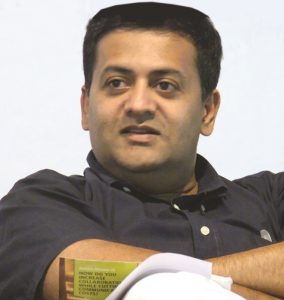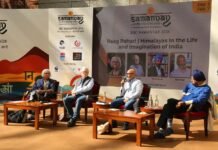The curtain has come down on the JCB Prize for Literature, regarded as the Indian equivalent of the Booker Prize – sending shock waves and triggering surprise in the literary world. News of the shutdown first made the rounds on 12 June on book blogger Keetabi Keeda’s post.
“It’s official: the JCB Prize for Literature is shutting down. And while a few quarters of the Indian literary scene may be busy mourning its exit, I, for one, won’t be sending flowers. I believe this is long overdue, not because literature doesn’t need recognition, but because prizes like the JCB had quietly become tools of cultural and intellectual gatekeeping, celebrating a very narrow, carefully curated slice of what they believed Indian literature ought to be,” Keeda’s post said.
The JCB Prize ghosted the Indian literary world with no formal farewell or announcement to mark its closure. The discontinuation of the prize was confirmed by its literary director, Mita Kapur, on 21 June. “The prize has been shut down. I am not going to deny something evident. But for everything else, ‘no comment’,” Kapur said.
JCB India, the corporate enterprise behind the JCB Prize, manufactures bulldozers among other construction equipment. The company ran into controversy with its bulldozers being used for the demolition of property by some state governments, such as Jammu & Kashmir, Assam, Madhya Pradesh, Gujarat, Delhi-NCR, and Uttar Pradesh – mostly against a particular community – as part of administrative steps.
An open letter signed by over 120 authors, poets, publishers and translators in 2024 condemned the prize for the involvement of JCB – even though indirectly – in these punitive measures. The JCB Foundation, however, chose to remain unresponsive on the issue.
The JCB Prize for Literature was launched in 2018. It has awarded seven literary works in seven consecutive years of its operation. While the winning writer was awarded Rs 25 lakh, the winning translator took home Rs 10 lakh. The award aimed to create a lasting impact on the Indian literature scene. The vision of the JCB Prize was to “celebrate Indian writing, and to help readers across the world discover the very best of contemporary Indian literature.”
The initial years of the JCB Prize were marked by extravagant soirees in five-star hotels and poolside longlist announcements with lavish expenditure on marketing and event management. However, the low-key ceremony for the 2024 prize at the company’s corporate head office in Faridabad, Haryana, was quite conspicuous.
Despite rumors about a possible closure was doing the rounds, no formal announcement was made for submissions for the 2025 awards. JCB has not gone public with its decision to terminate or pause the prize, though it was learnt from reliable sources that the facilitators have commissioned a survey to assess the significance of the prize over the seven years of its existence.
The first two years of the prize were shaped under the directorship of Rana Dasgupta. Mita Kapur of Jaipur-based Siyahi Literary Agency took over as its literary director from 2020, including the prizes announced during the Covid-19 pandemic.
A 12 March document regarding the revocation of the license granted to JCB Foundation, uploaded on the JCB Prize for Literature website, added a curious twist to the tale, though.
“Notice is hereby given that in pursuance of sub-section (4)(ii) of section 8 of the Companies Act, 2013, an application has been made by JCB Literature Foundation to the Registrar of companies, Delhi & Haryana at Delhi for revocation of the licence issued to it under section 8(5) of the companies Act, 2013. After the cancellation of license, the company will be required to add the word ‘Private Limited’ to its name in place of ‘Foundation’.” The document lists activities involved in running the Prize.
Significance of JCB Prize for Literature
The seven literary works awarded the JCB Prize for Literature between 2018 and 2024 are as follows:
2018: Jasmine Days by Benyamin, translated from Malayalam by Shahnaz Habib, and published by Juggernaut
2019: The Far Field by Madhuri Vijay, published by HarperCollins India
2020: Moustache by S Hareesh, translated from Malayalam by Jayasree Kalathil, and published by HarperCollins India
2021: Delhi: A Soliloquy by M Mukundan, translated from Malayalam by Fathima EV and Nandakumar K, and published by Westland
2022: The Paradise of Food by Khalid Jawed, translated from Urdu by Baran Farooqi, and published by Juggernaut
2023: Fire Bird by Perumal Murugan, translated from Tamil by Janaki Kannan, and published by Penguin Random House India
2024: Lorenzo Searches for the Meaning of Life by Upamanyu Chatterjee, and published by Speaking Tiger
It is noteworthy that the prize has been able to generate considerable interest in Indian English writing and regional Indian literature in translation, apart from reviving a literary culture in the subcontinent. While translated Indian regional literature won five out of the prize’s seven editions, the award has contributed greatly to bringing to the spotlight the vast expanse of translated Malayalam literature.
Litterateur K Satchidanandan, who is also director of the Kerala Literature Festival (KLF), said the award had a significant impact on Malayalam literature. “I am extremely sad about its closure. It was not just an award but major encouragement to translations from regional literature. Translation of creative works today is not just a literary activity but a profound cultural exchange that also helps national integration through a deep understanding of lives led in other parts of the country, as well as the range of our imagination expressed through language. We do not have many motivating rewards for translation, a very creative act that consumes a lot of time and demands genuine skill and bilingual sensitivity. I hope JCB will reconsider its disappointing decision and go on with its inspiring award that recognizes an extremely relevant literary endeavor with unique civilizational import.”

Sharing a similar sentiment, Ravi Deecee, CEO of DC Books, said as a publisher who won the JCB Prize three times in its short but impactful seven-year journey, particularly for works originally written in Malayalam, he finds its closure “deeply disheartening.”
“The JCB Prize stood apart for its bold commitment to Indian literature, translation, bridging regional languages with the wider English reading public in India and beyond. For us at DC Books, it was not merely a recognition of literary excellence but a validation of the wealth of stories rooted in local cultures, histories, and imaginations. The prize played a pivotal role in reshaping the national literary landscape, not just rewarding writers and translators, but encouraging publishers to take meaningful risks on voices that deserve to be heard. It is our sincere hope that JCB will reconsider this decision. At a time when translation is emerging as the most vital literary act in India’s multilingual democracy, such platforms are not just relevant; they are essential.”

Celebrated writer Jerry Pinto, who was in the jury of the JCB Prize for Literature as well as KLF Book Awards, said over a recent telephonic conversation, “I was very sorry to hear that the JCB Prize closed down. All prizes are a way in which society tells fiction writers that they are doing a good job and that they should continue.”
“Writing fiction is a lonely thing – you are inventing a world, you are inventing people and in the process of that invention, you are creating truth that maybe much more long-lasting than non-fiction ever is as the interior of the human mind and heart doesn’t change much and yet is infinitely various. A non-fiction has to respond to the world around it and capture only a moment of that world. I think, therefore, fiction prizes are important and I hope that some other corporates will take up the baton that JCB has dropped,” Pinto said.


















